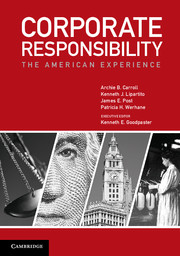Book contents
- Frontmatter
- Contents
- About the Authors
- Foreword
- Preface
- Introduction The Corporation in the Public Square
- Part I The Seeds of Corporate Responsibility
- Part II Corporate Responsibility Comes of Age
- Chapter 6 Corporate Legitimacy Affirmed (1945–1963)
- Chapter 7 A Revolution of Rising Expectations (1963–1973)
- Chapter 8 Managing Corporate Responsibility (1973–1981)
- Part III Taking Account of Corporate Responsibility
- Endnotes
- References
- List of Plates
- Index
- Plate section
Chapter 8 - Managing Corporate Responsibility (1973–1981)
Published online by Cambridge University Press: 05 November 2012
- Frontmatter
- Contents
- About the Authors
- Foreword
- Preface
- Introduction The Corporation in the Public Square
- Part I The Seeds of Corporate Responsibility
- Part II Corporate Responsibility Comes of Age
- Chapter 6 Corporate Legitimacy Affirmed (1945–1963)
- Chapter 7 A Revolution of Rising Expectations (1963–1973)
- Chapter 8 Managing Corporate Responsibility (1973–1981)
- Part III Taking Account of Corporate Responsibility
- Endnotes
- References
- List of Plates
- Index
- Plate section
Summary
By the mid-1970s, business executives began talking about “managing” corporate responsibility issues, not just “fighting fires.” Companies designed systems to address categories of significant issues (workplace discrimination, consumer protection, environmental protection) and developed methodologies for anticipating issues, formulating policy, and advocating corporate positions in the public square and the political arena. The idea that a corporation's responsibilities extended to various constituencies or stakeholders flourished, and many businesses and trade organizations embraced a multi-constituency model of business in society.
The social transformation of American business that began with the movements of the 1960s gained full force in the 1970s. New expectations meant new demands and the 1970s became a decade of deep change in American political and economic life. Advocacy groups felt empowered to press their claims. Business would be dramatically transformed. It became what one astute observer described as a “new reformation” that involved a “rewriting of the corporate social charter.”
- Type
- Chapter
- Information
- Corporate ResponsibilityThe American Experience, pp. 264 - 300Publisher: Cambridge University PressPrint publication year: 2012
- 2
- Cited by

